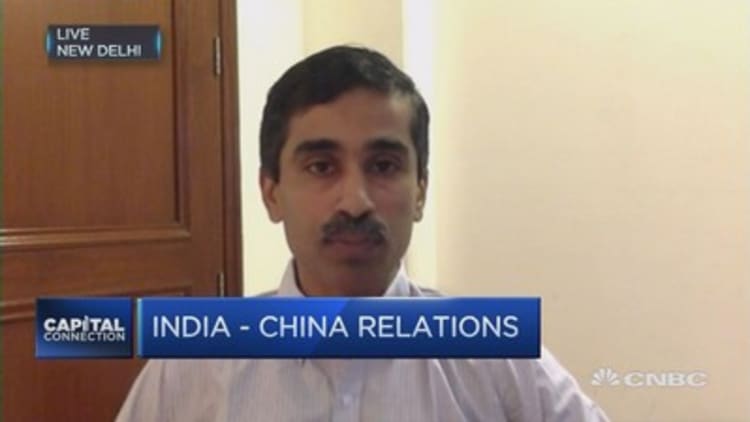If you go by official Indian government figures, Chinese direct investments into the country this century hit a paltry $1.6 billion in March 2017.
That's a weak showing compared to President Xi Jinping's 2014 promise to spend $20 billion over five years in India, one of the fastest growing Asian economies.
But while there's yet to be big bang investments accompanied by political fanfare, the Chinese have steadily and quietly been investing in Indian companies over the past few years.
In fact, people in India who work closely with Chinese businesses estimate that China's investments into the country could be at least five times greater than official numbers.
"Chinese investments have doubled in the last two years. I have no reason to doubt that it will not continue as they have already tasted blood. If you are a Chinese company today with a limitless amount of capital and you look at the whole world and ask 'where is the big bet you can play?' the answer is India," said Santosh Pai, a partner at Link Legal, a law firm with offices throughout India.
For his firm, Chinese clients are the growth drivers, and since 2011 he has helped about 150 of them get a foothold in the Indian market.
Typically, investments come in from Chinese-owned companies based in the U.S., Singapore or elsewhere in the world, and therefore cannot be classified as "Chinese" investments. Also, official data only tracks investments made by companies based in mainland China and not even those out of Hong Kong and Macau, experts said.
Low key, high returns
While businesses are happy to get Chinese money, it is in no one's interest to publicise those investments given the history of Indo-China relations. The two countries have fought a war and have regular skirmishes on their shared border.
"If a Chinese company says, 'We have entered the Indian market,' they will attract more scrutiny. If Indian companies say, 'We have Chinese investors,' they may lose some goodwill. It is not a conspiracy to hide these things, but the question is: Who does it benefit to stand on the roof and shout out?" Pai told CNBC.
A case in point is the recent investment of $1.1 billion by Shanghai Fosun Pharmaceutical Group for a 74 percent stake in India's Gland Pharma. The Chinese major that had struck a deal in July last year to buy an 86 percent stake in the Indian generic injectable drugmaker, reduced its stake size in a bid to save the stalled deal. The deal had raised concerns among some in the Indian government, Reuters reported.
India allows foreign investment of up to 100 percent in its pharmaceutical sector, anything above 74 percent requires government clearance.
"Investments that are not administered or influenced by government perception are pouring in," Aravind Yelery, assistant director at the New Delhi based Institute of Chinese Studies, told CNBC. "The Indian state governments are wary of the Chinese, so they are now doing [mergers and acquisitions] and [joint ventures] in the private sector. No mainstream, huge infrastructure investments."
Boosting start-up morale
Instead, Chinese investors are coming into India with bite-sized deals of as little as $1 million for start-ups. The big spenders on that front have included Tencent and Alibaba. The two have invested $1.2 billion and $650 million, respectively, in venture capital and private equity deals over the past two years, according to data from tracking firm Venture Intelligence.
That influx of funds has had a notable result in the Indian start-up community.
"The Chinese are boosting morale. There is a sudden change in the perception of Indian investors as well. If the Chinese are putting money into Indian start-ups, so will I, is the feeling," said Rishabh Lawania, co-founder of Xeler8, a start-up bought by a Chinese fund in January this year.
Xeler8 was a data mining company, but after the buyout it functions as a venture capital fund and incubator for start-ups.
"The Chinese are here with deep pockets. It is not uncommon for them to write a million dollar check for a first stage investment. An Indian angel investor is not going to do that. He will invest one fourth that amount," said Sunil Kalra, a veteran investor in Indian start-ups.
About $3.5 billion has been invested in companies less than 10 years old so far in 2017, according to Venture Intelligence. The Chinese have contributed a little less than 10 percent of that.

India's start-up sector, though still the third-largest in the world, has been facing a funding crunch and Chinese money has come as a boon for new entrepreneurs who are feeling the squeeze the most, says Lawania.
But there's even more of an upside to Chinese investment for companies that see it as a ticket to access the huge China consumer internet market.
For travel marketplace Ixigo, an investment from China's Fosun Kinzon Capital "has opened the gates of access to Chinese internet companies and China-based investors," said company co-founder Aloke Bajpai.
He added that he and his partners visited China and "saw for ourselves how scale and efficiency have driven excellent returns for shareholders in that market."
Despite those positives, the exuberance over Chinese micro capital and bigger investments in sectors like pharmaceuticals and solar energy took a hit few months back. Political tensions between the two Asian rivals escalated owing to a standoff in a disputed border area, and while business was almost as usual, the sentiment was affected, insiders said.
Two large Chinese funds that recently invested in Indian start-ups declined to be part of this article. The India head for one of those funds said, "Let things settle down a bit, then will do more [public relations]."


